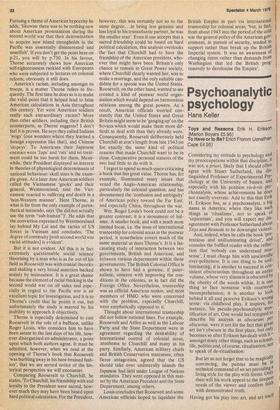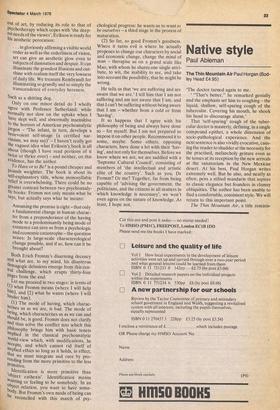Psychoanalytic psychology
Hans Keller
Toys and Reasons Erik H. Erikson (Marion Boyars £5.95) To Have or to Be? Erich Fromm (Jonathan Cape £4.95) Considering my attitude to psychology and my preoccupations within that discipline, It was not, a priori, likely that I should often agree with Stuart Sutherland, the dis' tinguished Professor of Experimental Psychology at the University of Sussex, and especially with his position vis-à-vis psY' choanalysis, whose achievements he does not exactly overrate. Add to this that Erik H. Erikson has, as a psychoanalyst, a big name in America, where they like such things as `ritualisms', not to speak of `sapientism', and you will expect my disagreement with Professor Sutherland about Toys and Reasons to be downright violent.
And, indeed, when he calls the book 'pre' tentious and unilluminating drivel', and consoles the baffled reader with the reflection that 'nobody can understand noll: sense', I must charge him with unscientific over-politeness. It is one thing to be und' luminating; it is another to succeed in con' sistent obscurantism throughout an entire volume, whose very slimness is obscured hY the obesity of the words within. It is one thing to face nonsense with courteous incomprehension; it is another to loolt behind it all and perceive Erikson's wrong sense: via childhood play, it inspires, for instance, his pseudo-psychoanalytic inYstification of art. One would feel tempted to describe his analysis as obscurum per obseurius, were it not for the fact that great art isn't obscure in the first place, but onlY becomes so after Erikson has,clealt with it amongst many other things, such as science, life, politics and, of course, ritualisation, not to speak of de-ritualisation: But let us not forget that to be magical.IY convincing, the painter must be 111 technical command of an art providing living style for the play with forms. OnlY then will his work appeal to the deePCI! needs of the viewer and confirm fait" with demonstrated truth.
Having got his play into art, and art itself out of art, by reducing its role to that of Psychotherapy which copes with 'the deepest needs of the viewer', Erikson is ready for his aesthetic peroration: • . . in gloriously affirming a visible world order as well as the orderliness of vision, art can give an aesthetic glow even to subjects of damnation and despair. It can Illuminate the grandest illusions and outshine with realism itself the very lowness ofdaily life. We treasure Rembrandt for Illuminating so grandly and so simply the transcendence of everyday hereness.
Such as a shitting dog.
Only on one minor detail do I wholly agree with Professor Sutherland: while normally not slow on the uptake when I have slept well, and abnormally insensitive to the horrors of American psychoanalytic Jargon – 'The infant, in turn, develops a benevolent self-image (a certified narcissism, we may say)' – I haven't really got the vaguest idea what Erikson's book is all about (though I have read portions of it twice or thrice over) – and neither, on this evidence, has the author.
To Have or to Be? is a pound cheaper and Pounds weightier. The book is about its self-explanatory title, whose monosyllabic relief is overwhelming. There could be no greater contrast between two psychoanalytic books: Fromm not only means what he says, but actually says what he means:
Assuming the premise is right – that only a fundamental change in human character from a preponderance of the having mode to a predominantly being mode of existence can save us from a psychologic and economic catastrophe – the question arises: Is large-scale characterological change possible, and if so, how can it be brought about?
Both Erich Fromm's disarming decency and what are, to my mind, his disastrous demagogic delusions emerge from this central challenge, which erupts thirty-four Pages from the end.
Let me proceed in two stages: in terms of (1,) what Fromm means (where I will help Ittni), and '(2) what he wants (where I will hinder him). (1) The mode of having, which characterises us as we are, is bad. The mode of being, which characterises us as we can and should be, is good. Fromm does not clarify and thus solve the conflict into which this Philosophy brings him with basic tenets implied in the classical psychoanalytic world-view which, with modifications, he ccepts, and which cannot rid itself of Implied ethics so long as it holds, in effect, that we must integrate and cure by proceeding from the more primitive to the less Primitive.
Identification is more primitive than Object cathexis'. Identification means wanting or feeling to be somebody. In an object relation, you want to have some I,)_ncly• But Fromm's own mode of being can ne reconciled with this march of psy chological progress: he wants us to want to be ourselves – a third Stage in the process of maturation.
(2) So far, so good Fromm's goodness. Where it turns evil is where he actually proposes to change our characters by social and economic change, change the mind of man – therapise us on a grand scale like Mao, with whom he shares one single attribute, to wit, the inability to see, and take into account the possibility, that he might be wrong.
He tells us that 'we are suffering and are aware that we are.' I tell him that I am not suffering and am not aware that I am, and that I can't be suffering without being aware that I am – whether from a cold or from 'having'.
It so happens that I agree with his philosophy of being and always have done so – for myself. But I am not prepared to impose it on other people. Recommend it to some, maybe. Some others, opposing characters, have done a lot with their 'having', and not only for themselves. Before we know where we are, we are saddled with a 'Supreme Cultural Council', consisting of members of 'the intellectual and artistic elite of the country'. Such as you, Dr Fromm? Or me? Together, far from being capable of 'advising the government, the politicians, and the citizens in all matters in which knowledge is necessary', we won't even agree on the nature of knowledge. At least, I hope not.



































 Previous page
Previous page